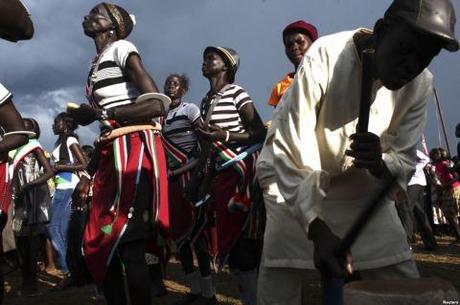
Photo: Voice of America
Following on the heels of the United States’ own Independence celebrations, the world’s newest country has just celebrated its 2nd birthday. On July 9, 2013, the people of South Sudan, with much fanfare, ushered in the second anniversary of their independence from Sudan.
The excitement level resembles that shown in 2011 during the referendum that led to South Sudan’s independence. For example, Sebit William of Miraya Radio reported on his program that a 65-year old man from Renk in Upper Nile State sold everything he had to come to Juba (the country’s capital) to celebrate the anniversary with his children.
However, at this time last year, the South Sudanese were more apprehensive, than celebratory – likely due to contentious disputes with our neighbor to the north over oil, which led to a complete shutdown of oil flows, halting the country’s main source of income. Leaders and citizens alike were not sure of the economic survival of the new state. Now in 2013, with the recent resumption of oil flows, many are hopeful about the possibilities for economic growth for the country. Additionally, other signs of progress are contributing to an unprecedented feeling of hope. While most of the lofty initial expectations of the South Sudanese have tempered with the reality of the long road ahead, there are still steps forward.
For example, the collection of non-oil revenues has improved since 2012 and financial control systems seem to be better than in pre-independence days. Ten officials in the Ministry of Finance and Economic Planning were arrested for fraud in March 2013, including the Director General for Stores. Three years ago, such an arrest would not have occurred due to a lack of financial control systems in place.
Agricultural activities have also improved, with the Food and Agriculture Organization (FAO) reporting that cereal yields have increased. The presence of private banks and hotels has increased; there were fewer than eight banks in 2011, and now there are more than fourteen banks operating in different parts of the country. The number of high schools has doubled. Jonglei, the largest of South Sudan’s ten states, has gone from one high school in 2006 to 15 now.
Despite these and other developments, citizens still express high levels of dissatisfaction with how the country is being run. Citizens throughout the country cite insecurity as their main concern, along with bad roads, lack of quality medical services, and corruption; and they want these problems solved. Government officials agree with these concerns: Vice President Dr. Riek Machar put corruption at the top of the list of challenges faced by the Government, followed by insecurity.
Good intentions are not too hard to find, but what is really lacking is actual implementation. A problem experienced all too frequently is the absence of follow-through between good plans on paper and putting those plans into action. Too often, plans are shelved, and the status quo is maintained.
The South Sudan Development Plan 2011-2013, for example, which was the Government’s first comprehensive plan, is one among many beautifully laid plans that has only existed on paper as it approaches expiration. Laws also fall victim to selective use when and as it suits the public official in charge of enforcing them. In Lakes State, the elected governor was removed because of increasing insecurity in the State. President Kiir quoted Article 101 (r) of the Transitional Constitution of the Republic of South Sudan, which provided the legal right to do so. However, the same Article 101 (s) of the Constitution also stipulates a 60-day period in which elections should be held to elect a new governor, but that part of the law was not respected: elections have not yet been held months after the expiration of the 60-day period.
It is this disconnect between the laws on paper and the laws in action that remains a major challenge to service delivery and good governance in the new state. Investors like predictability in laws and regulations in order to invest in a country. Security cannot improve if the prosecution of criminals is not consistent. Corruption will not stop if corrupt leaders know that the application of the law will vary.
The implementation problems we see today in the country are caused by weak institutions. The government of South Sudan, for example, is a mixture of administrators from varying backgrounds. Some have worked in Sudan for many years before transferring to South Sudan after independence, and some have no other administrative experience apart from commanding liberation forces in the bush during the civil war. Some of these administrators acquired their leadership skills from East Africa and other countries around the world and possess different ideologies that often conflict in program implementation.
When these different administrative ideologies are harmonized, South Sudan will join countries known for good governance around the world. More importantly, the little progress that the government has made in development will translate into real service delivery for the citizens of South Sudan. Even though the situation can seem disappointing, my personal hope is that South Sudan will join successful nations in the near future. It is a matter of time.
Zechariah Manyok Biar is the Research Coordinator of the newly established Center for Strategic Analysis and Research (C-SAR), a think-tank based in Juba. Mr. Biar earned a Bachelor’s Degree in Education from Kampala International University, Uganda; Master of Arts in Christian Ministry and Master of Science in Social Work from Abilene Christian University, Texas. Mr. Biar has written more than 100 newspaper articles for both online and print media. He can be reached at [email protected]
CIPE is partnering with C-SAR to provide research and policy analysis to the government and civil society, as well as bolster the think-tank’s institutional capacity as an important voice in the democratic policymaking process.

